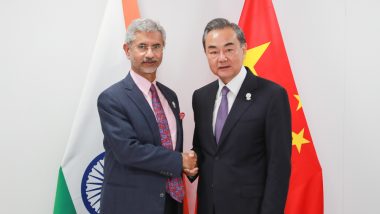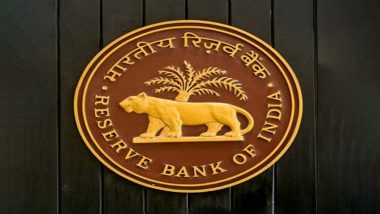Beijing, August 12: India and China on Monday agreed on a host of initiatives to improve their relations, with New Delhi emphasising that the future of the ties will depend on the mutual sensitivity to each other's "core concerns" to ensure that any bilateral differences should not become disputes. Making his first visit to China after taking over office, External Affairs Minister S Jaishankar held candid talks with top Chinese leaders. India, China Ties Should Be a Factor of Stability in Uncertain World, Says S Jaishankar.
His visit three-day visit to China comes amid spiralling tensions between India and Pakistan over the revocation of special status to Jammu and Kashmir.
Before he settled for a structured talk with his counterpart Wang Yi, Jaishankar met the tough-talking Chinese Vice President Wang Qishan, a close confidant of President Xi Jinping, at the picturesque residential complex Zhongnanhai, where China's top leaders reside.
He held a frank discussion with Wang Qishan about the state of the bilateral ties in the context of China's concerns over the bifurcation of Jammu and Kashmir into two Union Territories -- Jammu and Kashmir and Ladakh. After India revoked Article 370 last week, China issued two separate statements outlining its position on Ladakh and Jammu and Kashmir.
In one statement, China objected to the formation of Ladakh as a Union Territory by India, saying it undermined its territorial sovereignty. It also expressed "serious concern" about the current situation in the region and said, "relevant sides need to exercise restraint and act prudently". Article 370 Revoked in Jammu and Kashmir: China Calls on India, Pakistan to Resolve Disputes Through Talks.
After his meeting with Wang Qishan, Jaishankar held talks with Wang Yi -- first at the restricted delegation-level meeting followed by full-fledged delegation-level talks spanning over several hours. At the end of the talks, both Jaishankar and Wang made candid remarks at the 4th India-China media summit where they announced a host of initiatives to boost ties ahead of Xi's visit to India later this year.
Jaishankar said, "the future of the India-China relationship will obviously depend on mutual sensitivity to each other's core concerns". "It is natural, both as neighbours and large developing economies, that there would be issues in our ties. Properly managing differences is therefore vital. As our leaders agreed in Astana, differences should not become disputes. That is how India-China relations can remain a factor of stability in an uncertain world," he said.
The positive direction of ties after the Wuhan Summit has opened up a world of new convergences, he said, referring to the informal summit between Prime Minister Narendra Modi and President Xi last year. "Exploiting this and taking our ties to a new level will require strong public support in both societies. The media can make a major contribution to that goal," he said.
S Jaishankar Meets China Foreign Minister Wang Yi: Differences, If Any, Should Not Become Disputes:
In his remarks, Wang Yi said "we are of the view that guidance provided by our leaders (Xi and Modi) is the most important guarantee for the growth of China-India relations.
"It is especially important to maintain high-level engagement, in particular, to make the preparations for the second informal summit, to ensure that China-India relations will continue to move forward along the right direction," he said. He also highlighted difference especially over India-Pakistan tensions and border-related issues.
"Well, there are some differences between our two countries. We don't shy away from these differences. We have exchanged views on these issue in a candid manner," Wang said.
"Regarding recent tensions between India and Pakistan, we made clear China's concerns. On issues revolving on China's sovereignty and vital interests, we also stated China's principled position," he said.
India and China have 3,488-km long Line of Actual Control (LAC) between them. The two countries have held 21 rounds of Special Representatives-level talks so far to resolve the boundary dispute.
Wang Yi said, "we are of the view that we have to abide by the UN charter, respect sovereignty and territorial integrity of all countries, to properly address relevant disputes through dialogue."
Pakistan Foreign Minister Shah Mahmood Qureshi visited Beijing last week and held talks with Wang Yi. Earlier in his opening remarks at the talks, Wang said China and India as two big nations, also have important responsibilities for upholding the regional peace and stability.
"When it comes to the recent tensions between India and Pakistan and the possible ramifications, we follow these developments very closely. We hope that India would also play a constructive role for the regional peace and stability," Wang said.
On the boundary issue, he said, "We will continue to utilise the special representatives' mechanism over the boundary questions, to seek early harvest in the boundary negotiations, the CBMs (confidence-building measures) at the border areas and related cooperation to maintain peace".
The two ministers earlier held the second meeting of the high-level mechanism on cultural and people-to-people exchanges in which over dozen top officials representing various departments of the government took part. The two sides also held the 4th Media summit in which several journalists from both countries took part and interacted.
"We are of the view that to ensure the success of this high-level mechanism, people-to-people and cultural exchanges, the financial dialogue, the important institutionalised dialogues are very important," Wang said. "We need to strengthen our cooperation mechanisms including more defence exchanges so that we can make more practical results," he added.













 Quickly
Quickly




















